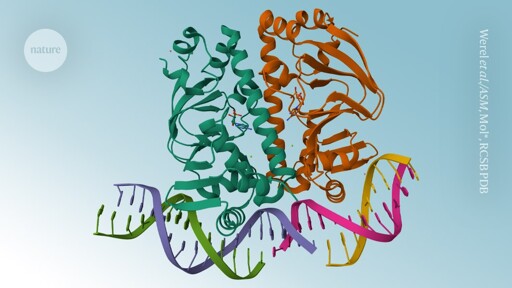Ask me about:
- Science (biology, computation, statistics)
- Gaming (rhythm, rogue-like/lite, other generic 1-player games)
- Autism & related (I have diagnosis)
- Bad takes on philosophy
- Bad takes on US political systems & more US stuff
I’m not knowledgeable about most other things
- 16 Posts
- 28 Comments

 81·9 days ago
81·9 days agoWell neuroscience isn’t a very old field… More seriously though, I think biomedical scientists know surprisingly little about something if NIH doesn’t fund it… aaand that’s how we understood so little about our own household companions (and a bit too much about cancer. Seriously why do we know so many weird things about cancer much of those don’t even translate into therapeutics)

 3·17 days ago
3·17 days agoI… think this question is a bit more complicated for this community. Following are only my personal opinion
Prescribed medication? I think so, I’d rather be physically and mentally healthy rather than have the other alternative. And usually medication (even ones with noted negative effects) are meant do do more good than harm so…
Recreational drugs… the line between this and the above is surprisingly not as clear-cut as it seems. I believe there are active lines of study of using various psychedelic compounds to treat mental disorders or other conditions… Personally I would take medically prescribed psychedelics if I am 1) under medical supervision and 2) based on evidence it would help my mental health (maybe that’s the answer to the question?)
Hard drugs: I don’t see how they can make anyone a better person, and no

 3·22 days ago
3·22 days agoI looked at their individual page (https://www.darkpattern.games/pattern/4/psychological-dark-patterns.html)…
If deleting the game and starting over from scratch sounds like a horrible idea and a waste of your investment, then the game has Endowed Value for you. The more time and money that you invest in the game, the more value it has over a fresh copy of the game.
So I guess they are referring to is something more transactional… for example, if I spent $100 on a gacha game or loot boxes to get a bunch of ultra-rare SSRs. I’d be pretty compelled to keep playing since I’ve already spent so much money on it.
They are not counting, for example, that I get hooked on some weird roguelike game because I genuinely want to get better at it but can stop any time. And if I lose my save file I would still happily start from scratch again (which, hilariously, a pattern named Infinite Treadmill is marked for both Slay the Spire and Balatro… https://www.darkpattern.games/pattern/14/infinite-treadmill.html)

 8·22 days ago
8·22 days agoI clearly didn’t drink enough coffee for this before posting
My bad, the original news article did a good job at explaining the missing link… I misunderstood what you were asking
- C-section babies seem to have more immune system-related diseases (https://doi.org/10.1016/j.jaci.2015.07.040), so scientists think they would benefit from special treatment
- Scientists tried to fix this by giving the babies vagina-derived bacteria (https://doi.org/10.1038/nm.4039); couldn’t find any more reports on this but it seems like these don’t work super well?
- This is a proof-of-concept by the lab highlighted in the news (https://doi.org/10.1016/j.cell.2020.08.047), they tried using fecal matter and it worked
- The abstract featured in the news is now a clinical trial that is in progress
I think that’s pretty much it

 16·22 days ago
16·22 days agoThis is the study they were referring to: https://doi.org/10.1016/j.jaci.2015.07.040
C-section babies have slightly higher risks of several diseases related to immune system function, and the hypothesis is that it is because these babies have slightly less developed immune systems

 7·25 days ago
7·25 days agoI happen to know a few folks who work in this field (detecting fraudulent scientific papers). This is a bit of an insider knowledge, but there are science sleuths who are fearing for their lives… there might be some seriously shady stuff going on behind research paper mills, but I don’t know who will be the one digging those up.
If it is just on an individual level though methinks Retraction Watch does a decently good job at informing what might or might not be trustworthy
A recent report on Retraction Watch, a PhD student was trying to figure out who’s behind a papermill: https://retractionwatch.com/2024/10/01/hidden-hydras-uncovering-the-massive-footprint-of-one-paper-mills-operations/
This is from Nature News today: https://www.nature.com/articles/d41586-024-03427-w. Heard a bit about this startup even before so…

 47·27 days ago
47·27 days agoThis again??
This time once archive.org is back online again… is it possible to get torrents of some of their popular data storage? For example I wouldn’t imagine their catalog of books with expired copyright to be very big. Would love a community way to keep the data alive if something even worse happens in the future (and their track record isn’t looking good now)

 4·29 days ago
4·29 days agoPretty sure the “intimate detail” is just the editor being horny… I didn’t make the title don’t blame me

 3·29 days ago
3·29 days agoHehe
Blame the Nature News editor for this, the paper title wasn’t horny at all

 2·1 month ago
2·1 month agoI got curious and wanted to see what method they are using: I believe they are using data from this portal? https://implicit.harvard.edu/implicit/selectatest.html
Looks like anyone can take this! But I guess that also means… did the dyslexics/dyscalculics self-select themselves?
Edit: took one. There is a demographics questionnaire where you can list whether you have disabilities, dyslexia is in there (but not Autism??)… So it is self-selected. And on unrelated note, I am apparently in the 1% that has a strong automatic preference for physically disabled rather than not-disabled people (facepalm

 2·1 month ago
2·1 month agoThis is a good point… I’m more used to biomedical papers where this author list would be considered typical or even short, but yeah the affiliations seem to state that there are four PIs on this paper which is wild… don’t know what to make of it. If someone knows archaeology better plz inform

 13·1 month ago
13·1 month agoI genuinely don’t know… there doesn’t seem to be any ongoing discussion of who or why are these people targeting IA. There are other people who are trying to rescue data stored on IA
Hope this would be over soon…

 6·1 month ago
6·1 month agoSo it was the physics Nobel… I see why the Nature News coverage called it “scooped” by machine learning pioneers
Since the news tried to be sensational about it… I tried to see what Hinton meant by fearing the consequences. Believe he is genuinely trying to prevent AI development without proper regulations. This is a policy paper he was involved in (https://managing-ai-risks.com/). This one did mention some genuine concerns. Quoting them:
“AI systems threaten to amplify social injustice, erode social stability, and weaken our shared understanding of reality that is foundational to society. They could also enable large-scale criminal or terrorist activities. Especially in the hands of a few powerful actors, AI could cement or exacerbate global inequities, or facilitate automated warfare, customized mass manipulation, and pervasive surveillance”
like bruh people already lost jobs because of ChatGPT, which can’t even do math properly on its own…
Also quite some irony that the preprint has the following quote: “Climate change has taken decades to be acknowledged and confronted; for AI, decades could be too long.”, considering that a serious risk of AI development is climate impacts

 323·1 month ago
323·1 month agoA bit off topic… But from my understanding, the US currently doesn’t have a single federal agency that is responsible for AI regulation… However, there is an agency for child abuse protection: the National Center on Child Abuse and Neglect within Department of HHS
If AI girlfriends generating CSAM is how we get AI regulation in the US, I’d be equally surprised and appalled

 4·1 month ago
4·1 month agoBased on my understanding of how these things work: Yes, probably no, and probably no… I think the map is just a “catalogue” of what things are, not at the point where we can do fancy models on it
This is their GitHub account, anyone knowledgeable enough about research software engineering is welcomed to give it a try
There are a few neuroscientists who are trying to decipher biological neural connections using principles from deep learning (a.k.a. AI/ML), don’t think this is a popular subfield though. Andreas Tolias is the first one that comes to my mind, he and a bunch of folks from Columbia/Baylor were in a consortium when I started my PhD… not sure if that consortium is still going. His lab website (SSL cert expired bruh). They might solve the second two statements you raised… no idea when though.

 4·1 month ago
4·1 month agoThanks! I think this is it… because I guess the more important part to this trope is that “hehe this is actually the world that you - dear viewer - lives in”… the high-fantasy part is secondary and depends on the genre I guess.

 6·1 month ago
6·1 month agoI… agree. Did get a lot of great recommendations tho!

 2·1 month ago
2·1 month agoEast Asia; again, never heard anyone refer to “24/7” specifically (ok maybe at more hipster places that try to imitate American businesses?)… There might be a similar idiom for it but I genuinely couldn’t think of any off the top of my head

 10·1 month ago
10·1 month agoI have actually never heard anyone say it this way specifically where I grew up… so technically the answer is “no”?
I tried to dug around and found a Reddit post saying this:
“The Oxford English Dictionary (OED) defines the term as “twenty-four hours a day, seven days a week; constantly”. It lists its first reference to 24/7 to be from a 1983 story in the US magazine Sports Illustrated in which Louisiana State University player Jerry Reynolds describes his jump shot in just such a way: 24-7-365.”
So this might be a fairly new idiom? Which would explain why it’s not really a thing in a lot of cultures… but I assume they have their ways of referring to this.
number of hours and days are the same
Ok akktually Japan has a rather interesting 30-hour day thing in the context of businesses… but jokes aside, the 24-hour, 7-day week system is indeed quite universal




My main social media app is Mastodon (technically Firefish which I will soon migrate to Iceshrimp… but those details are less relevant)
I consider Lemmy less so of a “social media” and more of a link aggregator/discussion forum… but yeah otherwise I try to use Lemmy a bit too. I still browse Reddit quite a lot, but only for individual communities that don’t have equivalents on Lemmy, and I no longer post there
I never used much social media to begin with tbh… I feel pretty decent about the Fediverse. Despite all the drawbacks (blocklists, fedi drama, etc), I think people collectively managed to make an objectively better social media platforms compared to the previous corporation-dominated ones (at least by my personal metrics)